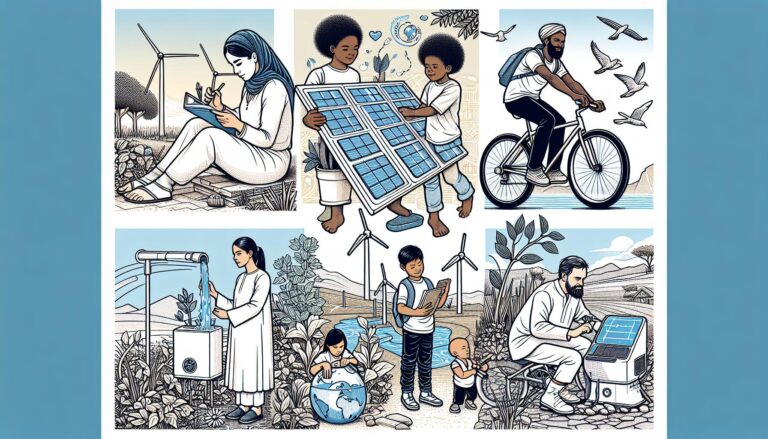As a seasoned travel enthusiast, I’ve witnessed firsthand the transformative power of sustainable travel. The global pandemic has undeniably shifted the way we explore the world, prompting a crucial reevaluation of our travel habits. Looking ahead, the future of sustainable travel post-pandemic holds immense promise and opportunity for both travelers and the environment.
In this article, I’ll delve into the emerging trends and innovations that are reshaping the travel landscape, from eco-friendly accommodations to carbon offset initiatives. By embracing sustainable practices and prioritizing responsible tourism, we can pave the way for a more conscious and impactful travel experience in a post-pandemic world. Join me as we explore the exciting possibilities that lie ahead for sustainable travel enthusiasts worldwide.
Importance of Sustainable Travel
Sustainable travel plays a vital role in shaping the future of our planet. It is crucial for preserving the environment, supporting local communities, and protecting wildlife. As a traveler, I believe it’s essential to be mindful of my impact and make conscious choices to minimize harm while exploring new destinations.
Embracing sustainable travel practices not only reduces carbon footprint but also contributes to the conservation of natural resources. By opting for eco-friendly accommodations, supporting local businesses, and engaging in responsible tourism activities, we can positively influence the destinations we visit.
Moreover, sustainable travel encourages cultural exchange and fosters mutual respect between travelers and locals. It promotes a deeper appreciation for diverse cultures and traditions, creating meaningful connections that go beyond typical tourist experiences.
In the post-pandemic world, the importance of sustainable travel has heightened as travelers seek more authentic and meaningful experiences. By prioritizing sustainability in my travel decisions, I can contribute to a more resilient and sustainable tourism industry that benefits both the environment and local communities.
Impact of the Global Pandemic
The global pandemic brought travel to a standstill and forced a reassessment of priorities. Many destinations experienced a significant drop in tourism, leading to economic hardships for local communities dependent on travel. I witnessed firsthand the sudden shift in travel behaviors and the urgency to adapt to a new reality.
Travel restrictions and lockdown measures prompted a reduction in carbon emissions and gave nature a chance to heal. It became evident that responsible travel practices are crucial for the well-being of our planet. The pandemic acted as a wake-up call, emphasizing the fragility of our ecosystems and the need for sustainable solutions.
During this time, virtual tourism and remote work gained popularity, offering a glimpse into the possibilities of tech-enabled travel. People’s appetite for authentic experiences grew stronger, highlighting the value of sustainable travel post-pandemic. I believe that the lessons learned during this period will shape the future of travel, steering it towards more mindful and purposeful journeys.
The resilient spirit of the travel community shone through as innovative solutions emerged to support local businesses and preserve cultural heritage. As restrictions ease, there is an opportunity to reimagine travel in a way that nurtures the planet and empowers communities. The pandemic underscored the importance of sustainable travel in creating a positive impact for both travelers and destinations alike.
Emerging Trends in Sustainable Travel
As I look ahead to the future of travel post-pandemic, it’s crucial to recognize the emerging trends that are shaping the landscape of sustainable travel. Here are some key developments to keep an eye on:
- Rise of Eco-friendly Accommodations: Sustainable travelers are increasingly opting for eco-friendly accommodations such as green hotels, eco-lodges, and off-grid stays that prioritize energy efficiency and reduce environmental impact.
- Focus on Community-based Tourism: Travelers are showing a growing interest in community-based tourism initiatives that empower local communities, provide authentic cultural experiences, and contribute directly to local economies.
- Embrace of Slow Travel: Slow travel, characterized by a more leisurely pace, deeper cultural immersion, and lower carbon footprint, is gaining popularity as travelers seek meaningful connections with the places they visit.
- Advancement in Sustainable Transportation: The travel industry is witnessing advancements in sustainable transportation options, including the rise of electric vehicles, sustainable aviation fuels, and improved public transportation infrastructure to reduce carbon emissions.
- Demand for Regenerative Tourism: Regenerative tourism, which focuses on restoring and replenishing natural and cultural resources, is becoming a growing trend as travelers seek to leave a positive impact on the destinations they visit.
These emerging trends in sustainable travel reflect a shift towards more mindful and responsible travel practices that prioritize environmental conservation, support local communities, and foster authentic and enriching travel experiences. By embracing these trends, we can contribute to a more sustainable and resilient future for travel post-pandemic.
Innovations in Eco-friendly Accommodations
In recent years, there has been a noticeable shift towards sustainability in the hospitality industry, with a growing number of eco-friendly accommodations leading the way. From green rooftops to solar panels and rainwater harvesting systems, hotels and lodges are implementing creative solutions to reduce their environmental impact.
Key trends in eco-friendly accommodations include:
- LEED-certified buildings that prioritize energy efficiency and sustainable materials.
- Zero-waste initiatives such as composting programs and single-use plastic bans.
- Biophilic design that incorporates natural elements for a harmonious guest experience.
- Carbon-neutral operations achieved through offsetting carbon emissions and renewable energy sources.
By choosing to stay in these eco-conscious establishments, travelers can support sustainable practices while enjoying a unique and guilt-free travel experience. The future of travel lies in environmentally responsible accommodations that prioritize the well-being of our planet.
Carbon Offset Initiatives in Travel
As sustainable travel gains momentum, carbon offset initiatives play a crucial role in minimizing the environmental impact of travel. These initiatives aim to counterbalance the carbon emissions produced during transportation, accommodation, and other travel-related activities. By investing in projects that reduce greenhouse gas emissions or promote renewable energy, travelers and travel companies can help mitigate their carbon footprint.
Some airlines have implemented carbon offset programs that allow passengers to purchase carbon credits to offset the emissions generated by their flights. Additionally, hotels and tour operators are increasingly offering carbon offset options to environmentally conscious travelers. These initiatives enable travelers to take responsibility for their carbon emissions while supporting environmentally beneficial projects worldwide.
Carbon offset projects can include reforestation efforts, renewable energy projects, and methane capture initiatives. By supporting these projects, travelers can contribute to global sustainability efforts and help combat climate change. Choosing to participate in carbon offset programs is a tangible way for individuals to demonstrate their commitment to environmentally responsible travel practices.
Travelers can also explore voluntary carbon offset calculators to estimate the carbon emissions generated by their trips and determine the appropriate amount to offset. This level of transparency allows travelers to make informed decisions about their carbon footprint and take proactive steps to neutralize their impact on the environment.
By engaging with carbon offset initiatives in travel, individuals can align their values with their actions, supporting a more sustainable and eco-friendly future for the travel industry. Embracing these initiatives is an impactful way to contribute to global efforts in combating climate change and preserving the planet for future generations.
| Key Facts | Data |
|---|---|
| Total CO2 emissions offset in 2020 | 126 million metric tons |
| Average cost per ton of CO2 offset | $3 – $15 |
| Top carbon offset project types | Reforestation, renewable energy, methane capture |
Key Takeaways
- Sustainable travel is crucial for preserving the environment, supporting local communities, and protecting wildlife.
- Embracing sustainable practices reduces carbon footprint and promotes conservation of natural resources.
- The global pandemic highlighted the importance of responsible travel and the fragility of ecosystems.
- Emerging trends in sustainable travel include eco-friendly accommodations, community-based tourism, slow travel, sustainable transportation, and regenerative tourism.
- The hospitality industry is evolving towards eco-friendly accommodations with initiatives like LEED certification, zero-waste programs, biophilic design, and carbon-neutral operations.
- Carbon offset initiatives in travel play a vital role in minimizing environmental impact by allowing travelers to offset their carbon emissions through projects like reforestation and renewable energy.
Conclusion
Embracing carbon offset initiatives is key to shaping a more sustainable future for travel post-pandemic. By supporting projects that mitigate carbon emissions, we can play a vital role in preserving the environment and combatting climate change. As airlines, hotels, and tour operators continue to offer carbon offset programs, travelers have the opportunity to make a positive impact on a global scale. Investing in initiatives like reforestation and renewable energy not only helps neutralize our carbon footprint but also fosters a greener and more responsible travel industry. Let’s take proactive steps towards a more sustainable and eco-friendly future in travel.



